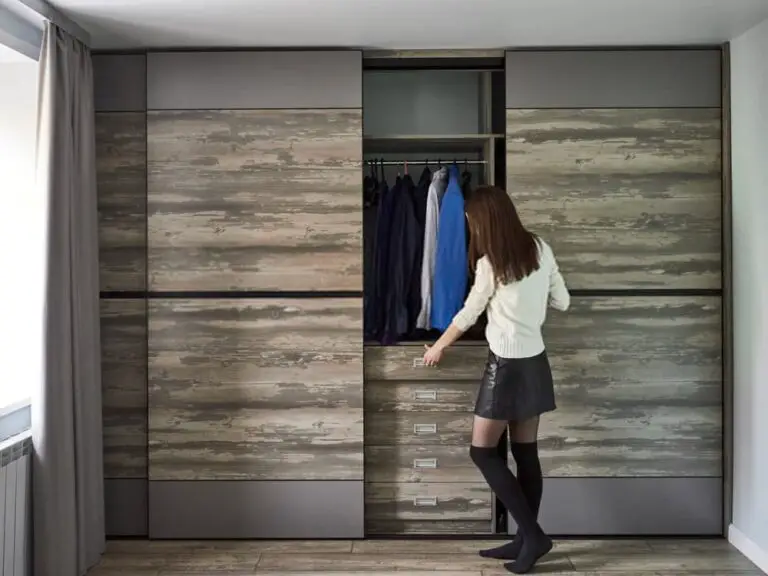17 Types Of Bathroom Floor Tiles: Pros And Cons (With Pictures)
The world of bathroom tiles can be overwhelming, with numerous options vying for attention. Each type has its unique characteristics, advantages, and drawbacks. As you navigate the process of selecting the perfect tiles for your bathroom renovation or simply considering your options, it’s essential to understand the various types of bathroom tiles available. In this post, we’ll delve into the most common types of bathroom tiles, exploring their benefits and limitations.
Whether you’re a seasoned renovator or just starting your tile journey, you’ll find valuable insights to guide your decision-making process.
Cement-Bodied Tile
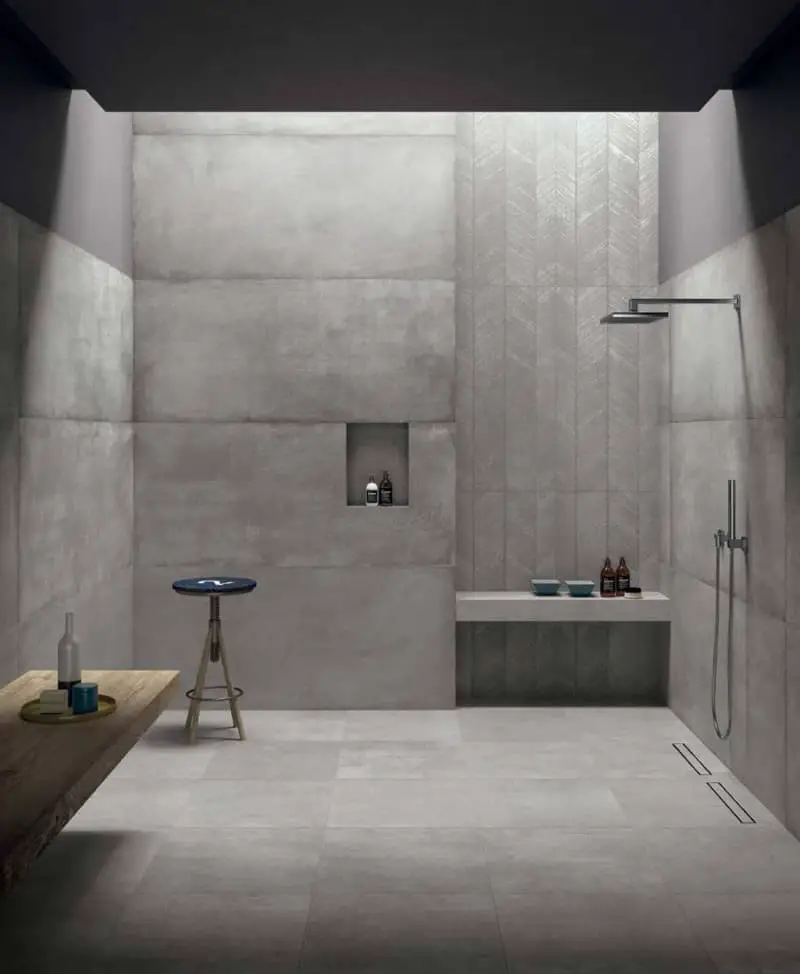
What is a cement-bodied tile?
Cement-bodied tile is a versatile and practical option for flooring and wall coverings. This type of tile is created by combining cement, sand, and water, resulting in a durable and easy-to-clean material. With its wide range of available colors and finishes, including glazed and unglazed options, cement-bodie tiles can seamlessly blend into various interior designs. The three primary types of cement-bodied tiles offer distinct characteristics that cater to different tastes and preferences.
Glazed tiles boast a smooth surface adorned with intricate designs or vibrant hues, providing a sophisticated look. On the other hand, unglazed tiles feature a natural, matte finish with minimal design elements, resulting in a more understated aesthetic. Through-body tiles take a unique approach by featuring a single, solid piece of tile with color that runs consistently throughout, creating a visually striking effect.
This diversity in finishes and designs enables homeowners to select the perfect cement-bodie tile to complement their specific style.
Pros and cons of cement-bodied tiles:
While cement-bodied tiles remain a top pick for bathroom floors and walls due to their ruggedness and simplicity in maintenance, it’s crucial to acknowledge the potential pitfalls. If improperly installed, these tiles may develop cracks or chips over time, compromising their overall appearance and functionality. Furthermore, if damage does occur, repairing cement-bodied tiles can prove to be a challenging task.
Ceramic Tiles

What is ceramic tile?
Ceramic tile, crafted from clay, has earned its place as one of the most sought-after tile options due to its remarkable durability and low-maintenance requirements. Its versatility allows it to be seamlessly integrated into various applications, including floors, walls, and countertops. Furthermore, ceramic tiles boast a diverse range of colors, shapes, and sizes, making them an ideal choice for homeowners seeking to infuse their spaces with visual interest.
Pros and cons of ceramic tiles:
While ceramic tiles are a top pick for bathroom flooring due to their sturdiness, ease of cleaning, and traction, homeowners must also consider the potential drawbacks. On one hand, they can be a significant investment, and on the other, improper installation can lead to cracks, compromising their overall durability.
Cork Tiles

When it comes to eco-friendly options for bathroom flooring, cork stands out as a top contender. Not only is it a sustainable material, but its durability is unmatched. Cork tiles, in particular, offer exceptional benefits. For one, they provide excellent traction, making them an ideal choice for bathrooms where slips and falls are a concern. Additionally, their natural insulation properties help regulate room temperature, reducing the need for harsh chemicals or excessive heat.
Furthermore, cork tiles are easy to clean and maintain, requiring little more than a damp cloth and some mild soap to keep them looking their best.
Pros and cons of cork tiles:
While cork tiles are a beloved choice for bathrooms due to their durability, ease of cleaning, and affordability, they do come with some drawbacks. One potential issue is the susceptibility to mold and mildew growth if not properly sealed, which can be a significant concern for homeowners. Additionally, if not adequately protected from water or moisture, cork tiles can suffer damage over time.
Furthermore, installing cork tiles without prior experience in tile installation can prove to be a challenging task. Despite these limitations, many homeowners still find that the benefits of using cork tiles outweigh the drawbacks.
Glass Tiles
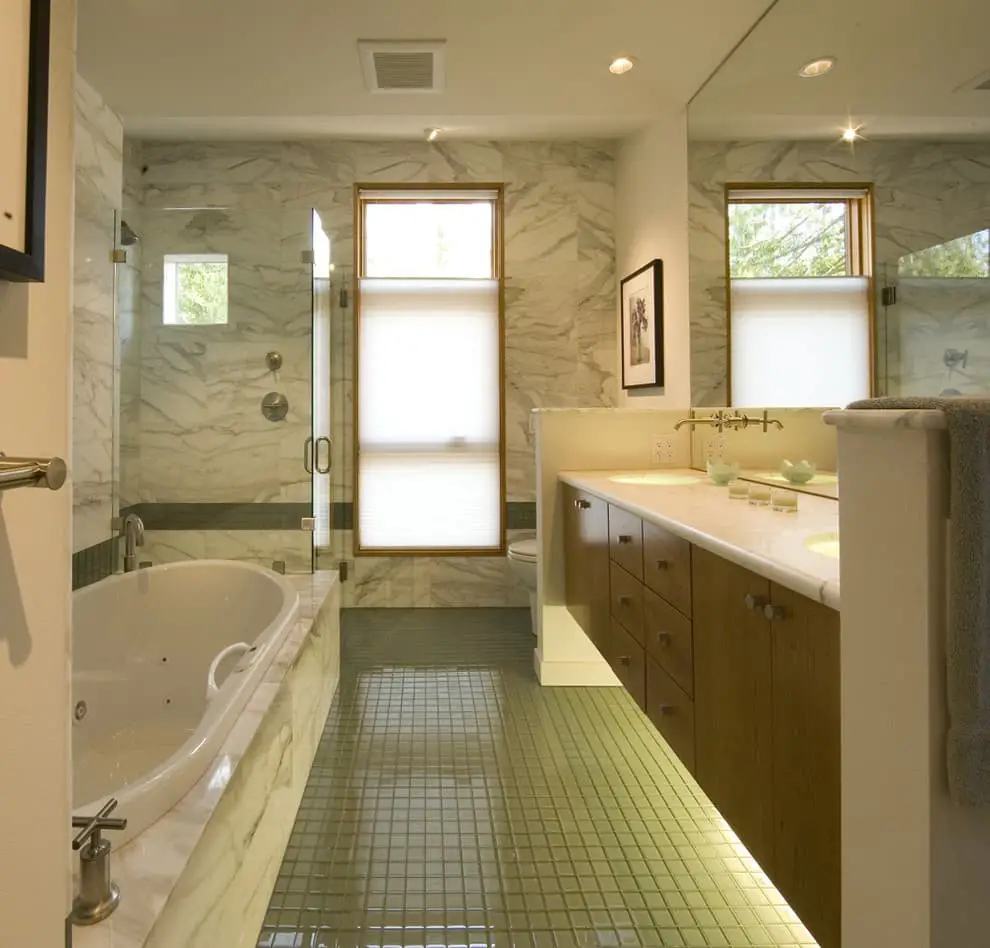
For centuries, glass has been a staple material in home design. Its enduring popularity stems from its ease of maintenance and cleaning, making it an ideal choice for bathroom tiles. With a kaleidoscope of colors, shapes, and sizes to choose from, glass tiles offer endless possibilities for creating a one-of-a-kind look in your bathroom. What’s more, many glass tile products are crafted from recycled materials, making them a sustainable option for eco-conscious homeowners.
Additionally, the non-porous nature of glass tiles ensures they won’t absorb spills or dirt, keeping your bathroom tidy with minimal effort. From traditional to modern designs, glass tiles come in a wide range of styles and price points, allowing you to find the perfect fit for your unique bathroom space.
Pros and cons of glass tiles:
When it comes to bathroom design, glass tiles are an excellent choice for adding a touch of elegance and sophistication. Their versatility lies in their vast color palette and diverse styles, allowing you to create unique patterns that reflect your personal taste. Additionally, glass tiles boast ease of maintenance, making them a practical selection.
Nevertheless, it’s essential to consider the potential drawbacks: glass tiles can be more costly than other tile options and may demand greater care when cleaning. Furthermore, their smooth surface can become slippery when wet, necessitating caution in high-moisture areas.
Granite Tiles

What is granite tile?
Granite, a natural stone unearthed from beneath the earth’s surface, undergoes a transformation into thin, flat tiles. A meticulous process involving cutting and polishing renders the material suitable for a variety of applications. Its durability and ease of maintenance have solidified granite tiles as a popular choice among homeowners. Beyond its general popularity, there are several distinct types of granite tile that cater to specific needs.
The polished variant boasts an impressive shine, making it a staple in bathrooms and kitchens where aesthetics are paramount. On the other hand, honed granite, characterized by a matte finish, offers enhanced traction compared to polished varieties. Its reduced slip factor makes it an excellent option for high-traffic areas like entryways and laundry rooms.
For spaces that demand extra grip, tumbled granite tiles present a textured surface capable of adding vital traction to areas prone to slips and falls, such as showers and baths.
Pros and cons of granite tiles:
When considering granite tiles for your bathroom, it’s essential to weigh the pros and cons. On one hand, these tiles boast impressive durability, ease of cleaning, and a unique natural charm that can elevate the overall aesthetic of the space. However, they also come with a higher price tag and require regular maintenance to prevent water damage. Before making a decision, consider the following factors: cost, maintenance needs, durability, and visual appeal.
While granite tiles may be a significant investment upfront, their long-term benefits and timeless style can make them a worthwhile choice for many homeowners.
Limestone Tiles

What is limestone tile?
Natural stone enthusiasts often rave about limestone tile’s unique charm, which stems from its sedimentary rock composition. This soft yet workable material has made it a top pick for bathroom tiles, with homeowners loving the variety of honed and polished finishes available. From a wide range of colors to suit any design aesthetic, limestone tiles truly offer something for everyone.
But what makes limestone stand out as an excellent choice for bathroom flooring is its impressive combination of slip-resistance and durability. And while it’s tempting to admire the material’s natural beauty, it’s crucial to remember that limestone is a porous substance, demanding regular sealing to prevent unsightly stains from forming.
Pros and cons of limestone tiles:
Each limestone tile boasts a distinct pattern and color, making every piece unique. While this characteristic may appeal to some, it might not be the best fit for those seeking uniformity. Additionally, limestone’s softness renders it prone to scratches and wear over time. Fortunately, these imperfections can be easily restored through buffing or polishing. Limestone tiles are a timeless choice for bathrooms, exuding elegance and sophistication.
However, their premium nature means you’ll need to weigh the benefits against the cost, making it essential to research thoroughly before making a purchase.
Linoleum Floor Tiles

What is linoleum floor tile?
The origins of linoleum floor tile date back to the 1860s when Frederick Walton first created this unique material by combining linseed oil, wood flour, and cork dust. The result was a durable and versatile substance that would go on to become a popular choice for flooring in various settings.
Today, linoleum tiles are available in an array of colors and designs, making them a staple in many homes, particularly in areas like bathrooms, kitchens, and laundry rooms where ease of cleaning is paramount.
Pros and cons of linoleum floor tiles:
Linoleum floor tiles are a popular option for many homeowners due to their affordability and ease of installation. While they have several advantages, linoleum does have some drawbacks that should be considered. For instance, it may not be as durable as other flooring materials, requiring more frequent replacement. Furthermore, linoleum can be challenging to clean and is prone to staining, which can be frustrating for homeowners who value a tidy living space.
Marble Tiles

What is marble tile?
Marble tile, a type of natural stone tile, is crafted from genuine marble. This metamorphic rock originates when limestone undergoes extreme heat and pressure, transforming it into the distinctive material we know today. Due to its luxurious and elegant reputation, marble tiles often command a higher price point compared to other bathroom tile options. Nevertheless, their versatility allows them to be incorporated into more laid-back settings as well.
What are the benefits of marble tile?
Marble tiles boast an impressive lifespan when properly maintained, with many years passing without issue. Their exceptional durability is further complemented by their remarkable strength, making it unlikely for them to chip or crack. In addition, marble’s heat resistance allows it to thrive in bathrooms that bask in the warmth of natural sunlight. Furthermore, cleaning and maintaining marble tiles is a breeze, as they resist stains impressively.
What are the disadvantages of marble tile?
One of the most significant drawbacks of marble tile is its notorious slipperiness when wet, requiring extra caution when walking on or using them in bathrooms and floors. Furthermore, marble tiles can be quite pricey, making them less accessible for some budgets. Additionally, marble’s porosity necessitates regular sealing to prevent unwanted stains from forming.
Metal Tiles

What is a metal tile?
Metal tiles offer a sleek and modern twist on traditional tiling options. Typically crafted from stainless steel, aluminum or copper, these tiles boast a range of benefits that make them an attractive choice for bathrooms. Not only are they waterproof and easy to clean, but they also come in a wide array of styles and designs. From smooth surfaces to textured ones, metal tiles cater to diverse tastes.
With a palette of colors to choose from, homeowners can easily find the perfect hue to match their bathroom’s aesthetic. As accent tiles, metal options can add an air of sophistication to any space. For those seeking a truly unique tile for their bathroom, metal tile is certainly worth considering.
What are the benefits of metal tile?
For a contemporary and sophisticated aesthetic in the bathroom, metal tiles are an excellent option. One of its greatest advantages is the ease with which they can be cleaned and maintained, making them a practical choice for busy households. Additionally, metal tile installation can create a luxurious ambiance that rivals high-end designs.
Furthermore, their exceptional durability ensures they can withstand heavy usage and frequent cleaning, making them an ideal solution for bathrooms that receive significant traffic.
What are the disadvantages of metal tile?
When it comes to metal tile bathrooms, one aspect to consider is the tactile experience. Upon touch, metal tile can feel chilly, making floor heating a necessary consideration for optimal comfort. Moreover, metal tiles are more prone to denting and scratching compared to other types of bathroom tiles. Furthermore, when wet, metal tile can become surprisingly slippery. Therefore, it’s crucial to select a tile with an impressive slip-resistant surface to mitigate this risk.
Mosaic Tiles
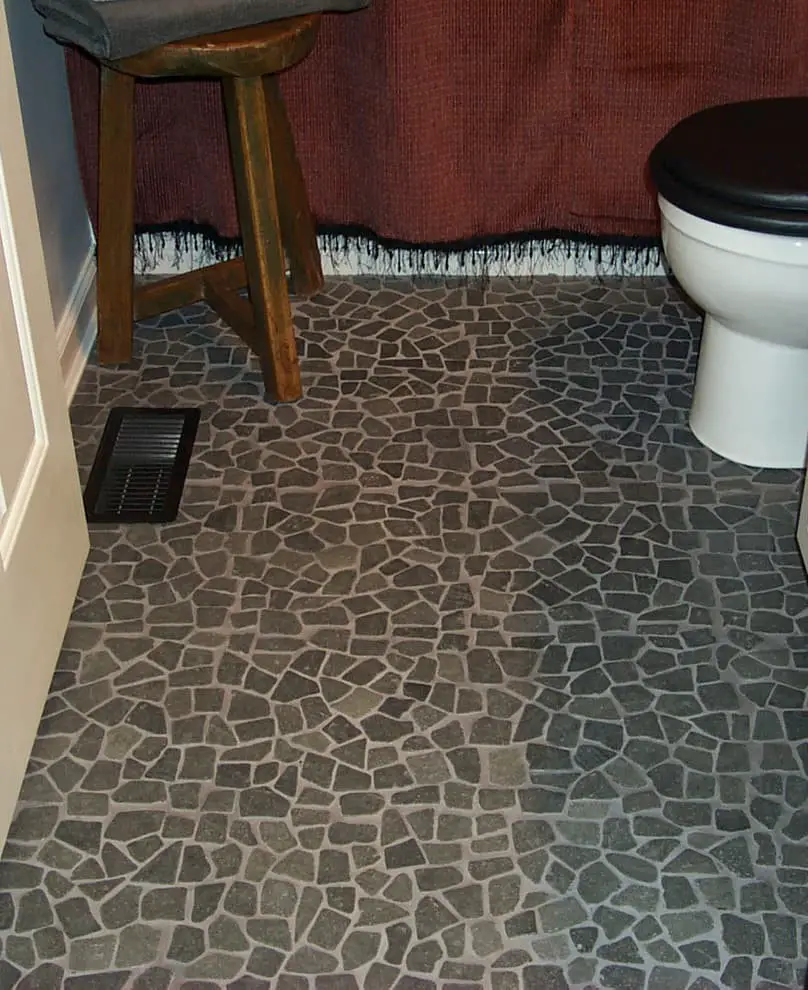
What is mosaic tile?
Small yet mighty, mosaic tiles are a popular choice for adding visual interest and creative flair to various surfaces. These tiny tiles can be arranged to form intricate patterns or even render images, making them a versatile design element. Typically crafted from glass, stone, or ceramic materials, mosaic tiles offer a range of aesthetic options, from subtle textures to vibrant colors.
What are the benefits of mosaic floor tile?
When it comes to selecting the perfect flooring solution for your bathroom, mosaic tiles should be high on your list of considerations. One of the primary advantages of mosaic tiles is their exceptional slip-resistance, making them an ideal choice for areas where water and moisture are present. Additionally, these tiles are known for their durability and ease of cleaning, ensuring they will withstand the rigors of daily use without compromising their appearance.
Furthermore, mosaic tiles offer a wide range of color options and patterns, allowing homeowners to create a truly one-of-a-kind look that perfectly complements their bathroom’s aesthetic.
What are the disadvantages of mosaic floor tile?
While mosaic tiles remain a popular choice for bathroom floors due to their visually appealing nature, they also come with some notable drawbacks. Notably, they tend to be more expensive compared to other flooring options. Additionally, installing mosaic tiles can be a challenging task that requires specialized skills and experience, which may necessitate hiring a professional installer.
Furthermore, the glossy finish of mosaic tiles can become slippery when wet, posing a potential safety hazard. As such, it’s essential to consider applying a non-slip coating or other safety measures to mitigate this risk.
Pebble Tiles

What is pebble tile?
While traditional ceramic or porcelain tiles may not provide the same level of grip and safety as pebble tile, this unique option has gained popularity in areas where water is present. Its textured surface ensures excellent traction, making it an ideal choice for showers, bathrooms, and other spaces where slip-resistance is crucial.
Interestingly, pebble tiles can be crafted from a diverse range of natural stones, such as marble, granite, quartz, and even glass, offering homeowners a wide array of design possibilities to suit their personal taste.
What are the benefits of pebble floor tile?
Pebble tiles bring a touch of elegance and distinctiveness to your bathroom’s aesthetic. With an array of colors and textures at your disposal, you can craft a truly bespoke look that reflects your personal style. Moreover, these tiles boast exceptional traction, making them an excellent choice for shower floors where safety is paramount. Notably, pebble tiles are also remarkably low-maintenance.
Unlike some other materials, they don’t require specialized cleaning products or elaborate treatment regimens. A simple sweep and mop with warm water often suffice to keep your tiles looking their best. Furthermore, the durability of pebble tiles ensures that with proper care, they will remain a stunning feature in your bathroom for years to come.
What are the disadvantages of pebble floor tile?
While pebble tiles may carry a higher price tag compared to other bathroom flooring options, they also demand more upkeep. Unlike ceramic or porcelain tile, which tend to require minimal maintenance, pebble tiles necessitate regular cleaning of the grout lines to prevent staining and subsequent sealing.
Plastic Laminate Tiles
What is plastic laminate tile?
In the world of bathroom tiles, one material stands out for its durability and practicality: plastic laminate. This versatile tile is crafted from synthetic materials, offering a unique combination of benefits that make it an ideal choice for bathrooms. For starters, it boasts excellent water resistance, rendering it impervious to moisture and humidity – a crucial factor in bathrooms where water splashes and spills are common.
Additionally, its smooth, non-porous surface makes cleaning a breeze, eliminating the need for excessive scrubbing or harsh chemicals. Furthermore, plastic laminate tile is available in a diverse range of hues and designs, allowing homeowners to effortlessly integrate it into their bathroom’s aesthetic.
What are the benefits of plastic laminate tile?
Achieving the look of stone or ceramic tile without breaking the bank is possible with plastic laminate tile, a budget-friendly option that’s both durable and easy to clean. Its versatility lies in its range of colors and styles, making it an ideal choice for any bathroom design. Furthermore, plastic laminate tile is surprisingly easy to install, allowing homeowners to take on DIY projects with confidence.
What are the disadvantages of plastic laminate tile?
While plastic laminate tile offers an affordable solution, its durability pales in comparison to ceramic and stone tile options. Furthermore, it’s prone to scratches and stains, making it less than ideal for spaces that require robust flooring. Additionally, the material isn’t suitable for high-traffic areas or zones with moisture present, as these conditions can further compromise its performance.
Porcelain Tiles
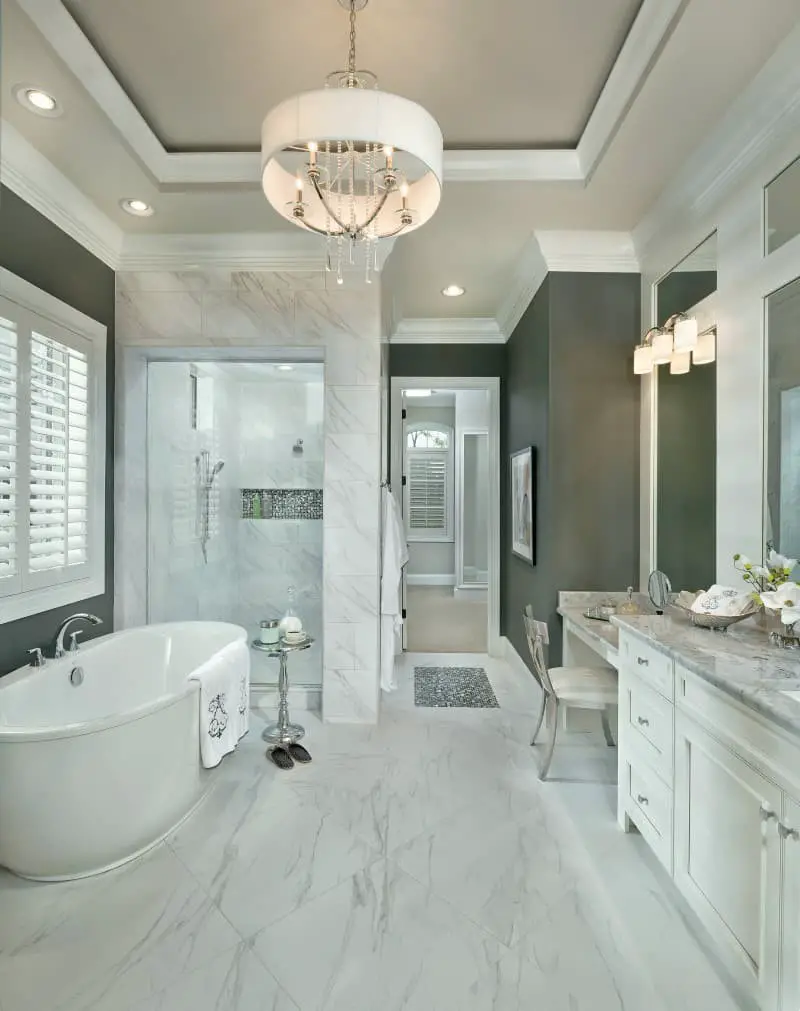
What is porcelain tile?
Porcelain tile, a popular choice in interior design, boasts a unique composition rooted in porcelain clay. Its exceptional density, hardness, and reduced porosity set it apart from other ceramic tile options. As such, it’s often employed in high-traffic areas like flooring, as well as on countertops and walls, where its durability is particularly valued.
What are the benefits of porcelain floor tile?
Crafted from the finest porcelain clay and subjected to elevated firing temperatures, porcelain tile stands out as a robust and water-resistant option. This unique process imbues the tile with exceptional durability, rendering it impervious to moisture absorption. With an array of vibrant colors and captivating designs to choose from, porcelain tiles have become a sought-after solution for bathroom flooring, where their resistance to water makes them an ideal choice.
What are the disadvantages of porcelain floor tile?
Porcelain floor tiles have gained widespread popularity for bathrooms, but it’s crucial to consider their drawbacks before making a final decision. One significant disadvantage is their inherent slipperiness when wet, posing a potential safety risk for young children or elderly family members living in the home. Furthermore, porcelain tiles are prone to cracking or chipping easily, especially if heavy objects are dropped on the floor.
Additionally, they tend to be more expensive compared to other bathroom flooring options, making it essential to weigh these factors carefully when selecting the ideal flooring solution for your space.
Slate Tiles

What is slate tile?
Slate tile, a type of natural stone, originates from metamorphic rock. Its characteristic smooth surface showcases a range of hues, from light to dark grey, or even black. As a natural material, each slate tile boasts one-of-a-kind patterns and colors, making every piece unique. Its popularity stems from its water-resistant and durable properties, making it an ideal choice for bathroom floors and walls.
With proper care and maintenance, slate tiles can withstand the test of time, lasting many years without compromising their aesthetic appeal or functional integrity.
What are the benefits of slate floor tile?
Slate, a versatile natural stone, boasts an impressive array of advantages. Its rugged durability ensures it withstands the test of time, while its effortless cleanliness makes maintenance a breeze. Additionally, slate’s textured surface provides exceptional slip-resistance, guaranteeing safety in high-traffic areas. Moreover, its distinctive appearance imbues any space with a unique charm, making it an ideal choice for those seeking to add character to their surroundings.
What are the disadvantages of slate floor tile?
While slate floor tile has its advantages, it’s not without its drawbacks. One significant limitation is its brittleness – a single heavy object dropped on the floor can cause it to crack or chip. Additionally, the soft nature of slate makes it prone to scratches from everyday objects like pet claws or furniture legs. Furthermore, the porous surface of slate tiles can make cleaning more challenging than with other materials.
As you consider installing slate floor tile in your bathroom, it’s essential to carefully balance its benefits against these potential drawbacks.
Terracotta Tiles
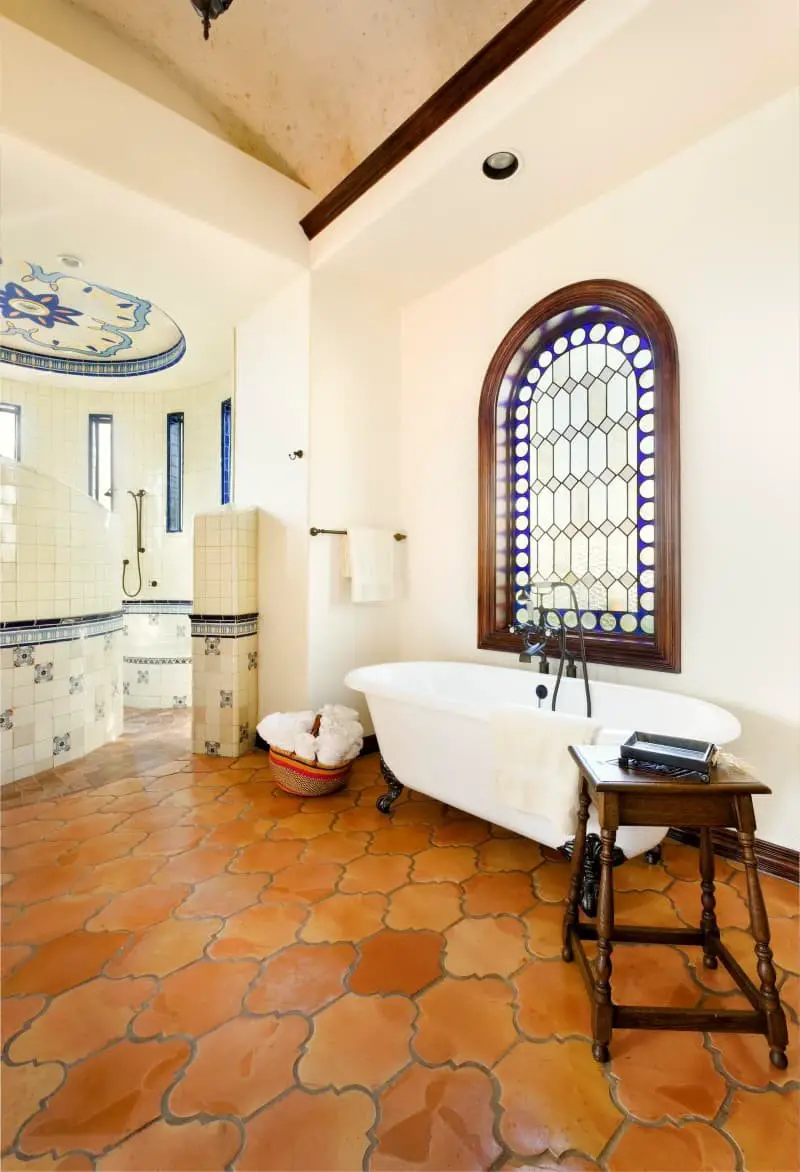
What is terracotta tile?
Natural terracotta clay is transformed into tiles through a process of shaping and firing in a kiln, resulting in a unique flooring and wall covering option that exudes rustic charm and distinct coloration. The versatility of terracotta tile is evident in its wide range of colors, encompassing shades of red, orange, yellow, brown, and tan, allowing homeowners to select a hue that suits their aesthetic. Additionally, the tiles can be glazed, imparting a sleek and shiny finish.
However, as a porous material, terracotta requires sealing before being used in areas like bathrooms to prevent water damage and staining, while also preserving its natural beauty.
What are the benefits of terracotta floor tile?
Terracotta floor tiles boast numerous advantages, with their natural composition rendering them remarkably resilient and effortless to upkeep. Moreover, this attractive material can significantly enhance the aesthetic appeal of your living space, injecting an air of unique character that sets it apart from more conventional flooring options.
What are the disadvantages of terracotta floor tile?
While terracotta floor tiles are a stunning and well-liked option for many homeowners, it’s essential to consider their drawbacks before making a decision. One of the primary concerns is their demanding cleaning requirements. Terracotta tiles are also prone to staining and scratching, which can lead to a worn appearance over time if not properly maintained.
Vinyl Tiles
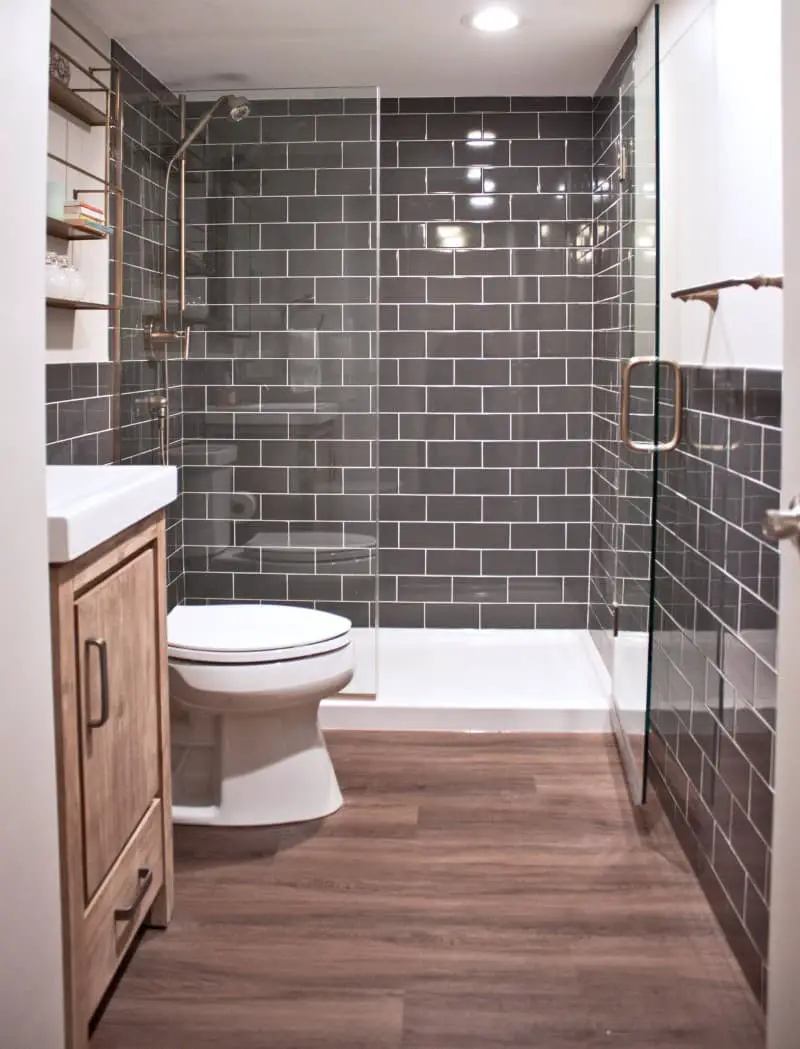
What is vinyl tile?
Vinyl tiles offer unparalleled versatility, available in a diverse range of colors and styles that enable users to create a multitude of looks. Their ease of installation is matched only by their durability and cleanliness, making them an attractive option for many applications.
In addition to their practical benefits, vinyl tiles boast impressive resistance to water, mold, and mildew, ensuring they remain a viable choice even in high-moisture environments like bathrooms.
Withstanding the rigors of daily use with ease, these tiles are an excellent solution for homeowners seeking low-maintenance solutions that can withstand the test of time.
What are the benefits of vinyl floor tile?
Vinyl tile offers a multitude of advantages that make it an attractive option for homeowners. Its durability, ease of installation, and low maintenance requirements ensure that it remains a practical choice for busy households. Additionally, its moisture-resistant properties make it particularly well-suited for bathrooms, where the risk of mold growth is high. One of the most appealing aspects of vinyl tile is its versatility in terms of design and style.
With options ranging from stone-like finishes to wood-inspired patterns and ceramic-style tiles, homeowners can achieve their desired aesthetic without breaking the bank. Whether you’re aiming for a modern look or a more traditional feel, there’s a vinyl tile option that will fit your taste. Another significant benefit of vinyl tile is its ease of cleaning.
A simple sweep or vacuum is all it takes to keep the floor free from dirt and dust, while spills can be quickly cleaned up without leaving behind unsightly stains or scratches. Overall, vinyl tile offers a winning combination of practicality, style, and low-maintenance upkeep that makes it an excellent choice for homeowners seeking a hassle-free flooring solution.
What are the disadvantages of vinyl floor tile?
While vinyl tile offers many benefits, there are also some potential drawbacks to consider. One significant issue is its slipperiness when wet, making it essential to exercise caution when walking on vinyl floors in areas like bathrooms and kitchens where moisture is more prevalent. Additionally, vinyl tile can be prone to denting or scratching, which may require extra maintenance to keep your flooring looking its best.
Wood Floor.

Wood flooring is a top contender in the world of bathroom design, boasting durability and a warm, organic aesthetic that harmonizes with diverse styles. The versatility of wood floors lies in their ability to be stained to match any décor, making them an excellent choice for homeowners seeking a tailored look. Furthermore, they are relatively low-maintenance and simple to clean, qualities that are hard to come by in other flooring options.
However, it is essential to acknowledge the need for regular upkeep and the potential limitations of wood floors in humid environments.
When it comes to selecting the ideal tile for your bathroom, it’s crucial to consider the various types available. With so many options at your disposal, you should be able to find a tile that perfectly complements your space.
Should you have any queries or concerns regarding bathroom tiles, feel free to approach a sales associate at your local home improvement store for guidance.
Related Posts
When it comes to ensuring the safety of elderly individuals in walk-in tubs, there are several key features to look out for. Firstly, a non-slip surface is crucial to prevent falls and injuries. Secondly, adequate lighting can greatly improve visibility and reduce the risk of accidents. Thirdly, grab bars and handles provide support and stability, allowing users to move safely within the tub. Lastly, an alarm system or alert device can be a vital safety feature in case of emergency situations.
By incorporating these features into walk-in tub designs, we can create safer and more accessible bathing experiences for seniors.





